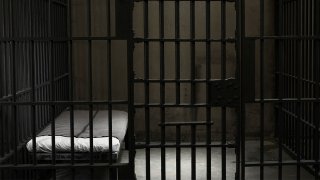
Warning that Bay Staters continue to face unaddressed public safety threats, Gov. Charlie Baker and Lt. Gov. Karyn Polito on Wednesday launched another bid to update how criminal suspects are declared dangerous and to prevent unauthorized sharing of sexually explicit material.
Baker filed updated versions of two bills that have previously stalled out in the Legislature, hoping to sway lawmakers to act on them during his final year in office.
One bill aims to rein in the harmful distribution of sexually explicit images and videos. It would make it a crime for anyone to share an explicit image or video, even if the content was obtained lawfully, without that person's consent and with the intent to cause harm.
More than 30 other states have taken similar steps to prevent the practice sometimes known as "revenge pornography," Baker said.
Get Boston local news, weather forecasts, lifestyle and entertainment stories to your inbox. Sign up for NBC Boston’s newsletters.
The legislation also addresses what Baker described as "unintended problems" in the existing child pornography law. Minors who distribute sexually explicit material to peers would default to educational diversion, and prosecutors who choose to use the juvenile justice system could charge the minors with a misdemeanor rather than a felony, under the proposal.
Schools would also be required to provide "age-appropriate education on the risks and harmful effects of the creation, possession, and distribution of sexually explicit visual depictions of minors as they relate to cyber-bullying," Baker wrote in his filing letter.
Local
In-depth news coverage of the Greater Boston Area.
Baker filed versions of the bill in 2017 and 2019, neither of which emerged for a vote in the Legislature.
The second bill Baker filed Wednesday builds upon the administration's push to increase protections from dangerous persons in the judicial process. It would expand the list of offenses that could provide grounds for a dangerousness hearing and allow prosecutors to request dangerousness hearings beyond a defendant's first court appearance.
In a letter to lawmakers, Baker said a defendant charged with rape was released in the summer of 2020 after a nonprofit paid the high cash bail. The suspect then allegedly committed another rape while on release, Baker said.
"The provisions of this legislation could have avoided that result by permitting prosecutors to request a dangerousness hearing after the defendant had been released on bail," Baker wrote.
At a news conference in Plymouth, Baker was asked about previous iterations of the bill that stalled out.
"I don't really know what the hesitation was," the governor said. "Massachusetts has always prided itself on being a progressive and fair and just community when it comes to its laws, especially when it comes to laws that involve aggression and violence and assault on women, and I think in this particular case people had a chance to hear today that our laws are failing many, many people in these circumstances and it's time they get fixed and we're going to work very hard to make that happen."
The bill would also allow police to detain individuals they observe violating court-ordered release conditions, empower judges to revoke a release for violating conditions without an additional dangerousness finding, and create a new felony offense for cutting off a court-ordered GPS device.
Police would additionally be required to take fingerprints of all people arrested, regardless of charge, rather than just those arrested for felony charges.
Baker had also unsuccessfully filed a version of the bill in the previous two sessions, but lawmakers declined to take it up on either occasion.
Neither bill Baker filed Wednesday has been assigned a bill number.